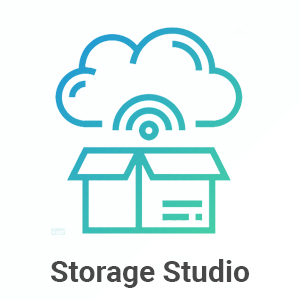


Storing data in the cloud not only enhances cost reduction but also improves business productivity, saves time, and provides better security of the infrastructure.
But traditional enterprise storage solutions are based on proprietary hardware and controller-based storage arrays, which are expensive and rigid. It causes issues like vendor lock-in, self-governed, shortage of large amounts of data storage, hardware failure.
Enterprises facing issues related to the traditional storage system, thus are more likely to adopt a cloud storage management service. Cloud storage is not only beneficial in the maintenance of infrastructure but also ensures productivity, security, disaster recovery, and cost-saving.
Intensification in technologies makes enterprises boost their business by adopting new technologies for cloud storage. Henceforth shifting to cloud storage for better productivity is somewhat trending & beneficial.
Click2Cloud has built a platform that is working to address storage integration challenges, particularly in scale-out cloud-native environments with heterogeneous storage platforms.
It is about creating a framework for universal storage control. It abstracts the storage complexities so that storage from any vendor can be discovered, provisioned, and managed in the same way regardless of the computing environment.
Clouds Brain of Click2Cloud with Storage Studio feature offers object and block storage for a single clustered platform. Click2Cloud and SODA Foundation open source community together has built features like multi-cloud for GCP, CEPH, AWS, S3, Azure, Huawei, Alibaba, IBM, OTC as storage back-end.
Clouds Brain collaboration with SODA Foundation storage not only helps in the data management ecosystem built but also drives research in technologies.
Clouds Brain object storage provides seamless migration, monitoring, and management services. Users can perform operations like creating a bucket, deleting a bucket, uploading objects, downloading objects, and deleting objects from a single platform.
Block storage helps to create snapshots. Users can also use these snapshots to back up the data. Block storage management service allows volume lifecycle management that utilizes devices and performs operations on volume, snapshot backup to any s3 compatible cloud service.
Below mentioned screen 1 is the Clouds Brain object storage module screen. It consists of an object. Object storage management allows the creation of storage, migration, monitoring, and management of multi-cloud providers like AWS, GCP, Huawei, IBM COS, Azure Storage, and Ceph.
Similarly, the next screen 2 is block storage which is another type of storage module of the Clouds Brain. Block storage management allows storage plus volume creation, snapshot, host, and app development.
Screen 1: Clouds Brain Object Storage Module
Screen 2: Clouds Brain Block Storage Module
Object storage helps to store a large amount of unstructured data in a highly scalable distinct unit. Clouds Brain storage feature provides object storage migration and can perform operations like creating buckets, deleting buckets, uploading objects, downloading objects, and deleting an object from a single platform.
2. Block Storage:
Block storage is used to store data files in cloud-based storage environments. Clouds Brain’s storage feature supports block storage that stores data in form of blocks with a unique identifier. The data stored in block storage is of fixed size. Volume lifecycle management, snapshots backup is some of the services offered by the block storage feature.
Currently, block storage supports the following storage drivers:
In lifecycle management, users can control the cost consumptions in storing blob data. Object undergoes various transitions like standard, standard_IA, Archive which reduces cost consumption depending upon these storage classes. We can control object retention and deletion in the same feature itself.
Clouds Brain storage offers a seamless object migration across data centers, on-premise, public cloud, private or hybrid cloud with multi-cloud functionalities. Enterprises boost their cloud storage migration journey with Clouds Brain storage seamless migration.
Click2Cloud Clouds Brain supports a heterogeneous platform that includes object storage, on-premise block storage, and cloud volume. Heterogeneous storage support helps in reducing reliance on a single vendor, increasing flexibility, cost-efficiency, adherence to local policies.
Clouds Brain storage studio helps in disaster recovery of data and gives a complete backup using snapshots of block storage.
Storage studio helps to store analytical and AI data. This works as a data framework and tons of data can be stored on top of it.
Data protection, lifecycle management, data operations, storage management are the cloud-native solutions for multi-data management storage.
Storage studio saves overall production cost, infrastructure cost, and provides a large-scale storage capacity over the cloud, and on-premise.
Storage studio helps in the management of data lifecycle to move data across storage tiers and archival for long-term retention.
A conventional storage system causes hardware failure, loss of data, high cost, low-speed operation, poor accessibility, etc. Thus, companies are moving to cloud computing storage platforms for better business growth where customers meet better productivity. Click2Cloud’s Clouds Brain Storage Studio provides customers a multi-cloud storage platform for an object, block, and file storage, etc. This not only saves time and money but also leverages to disaster recovery, better productivity, more customer insights, and business growth.